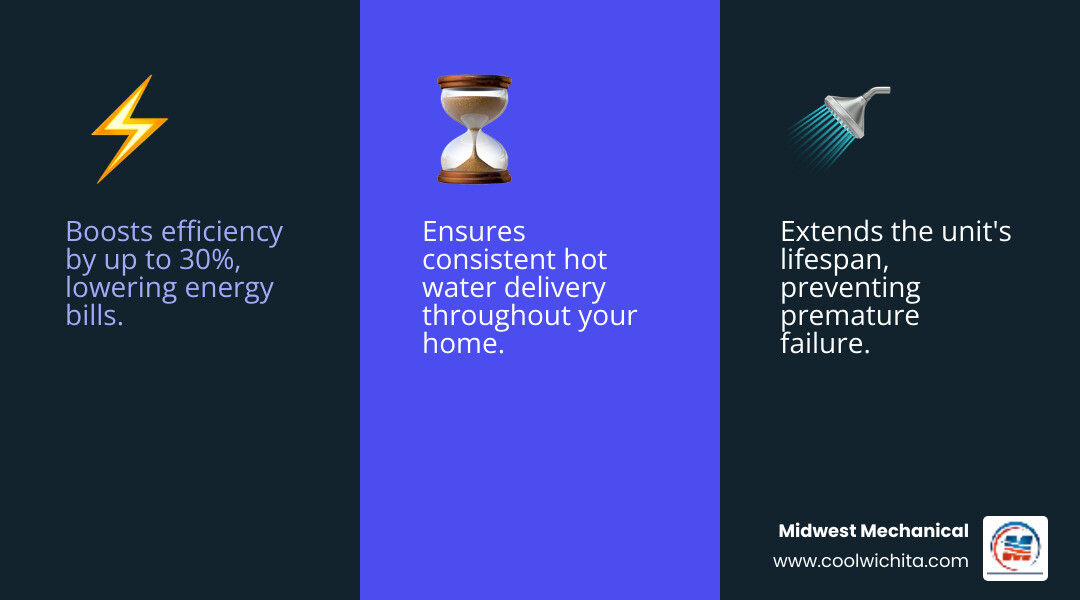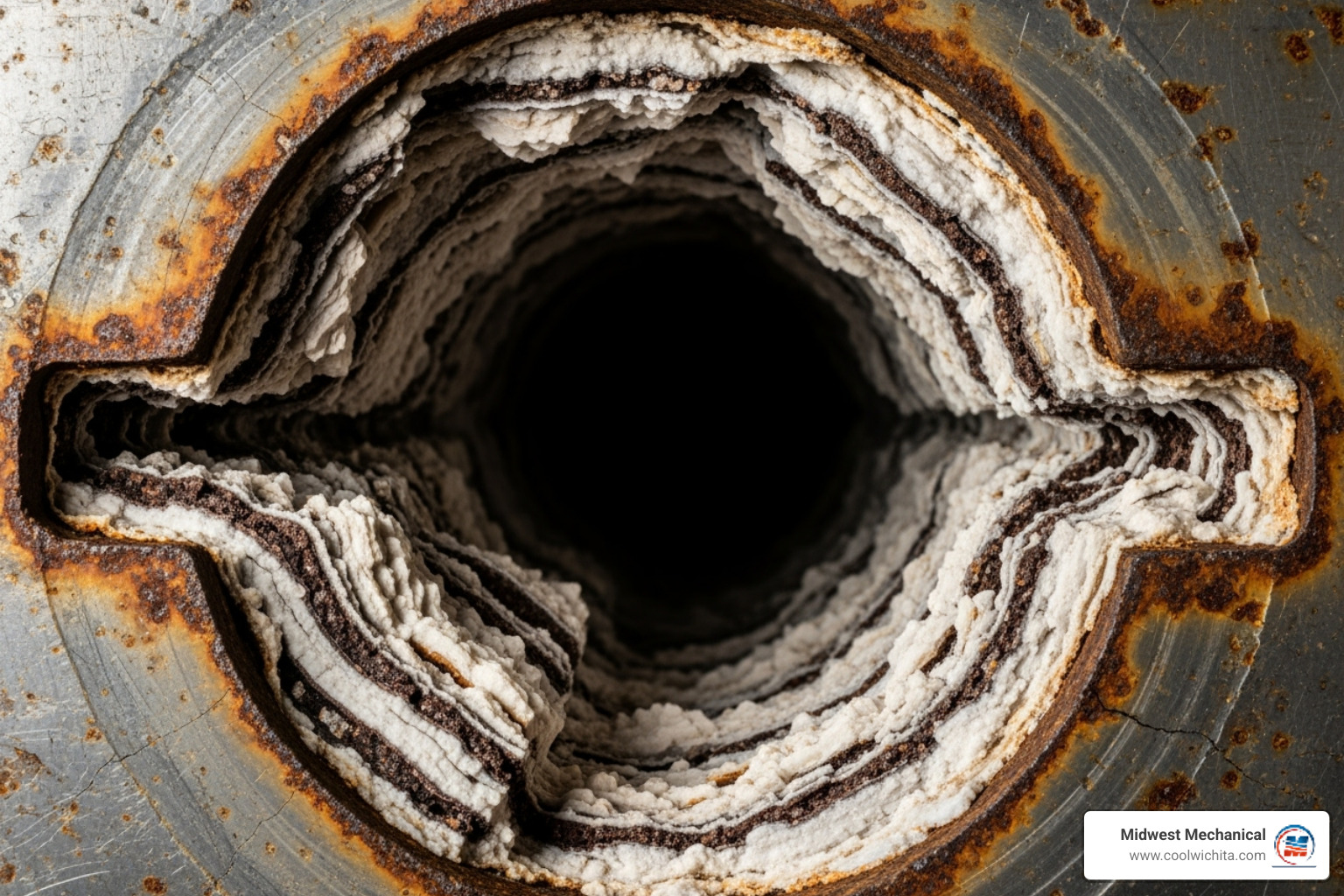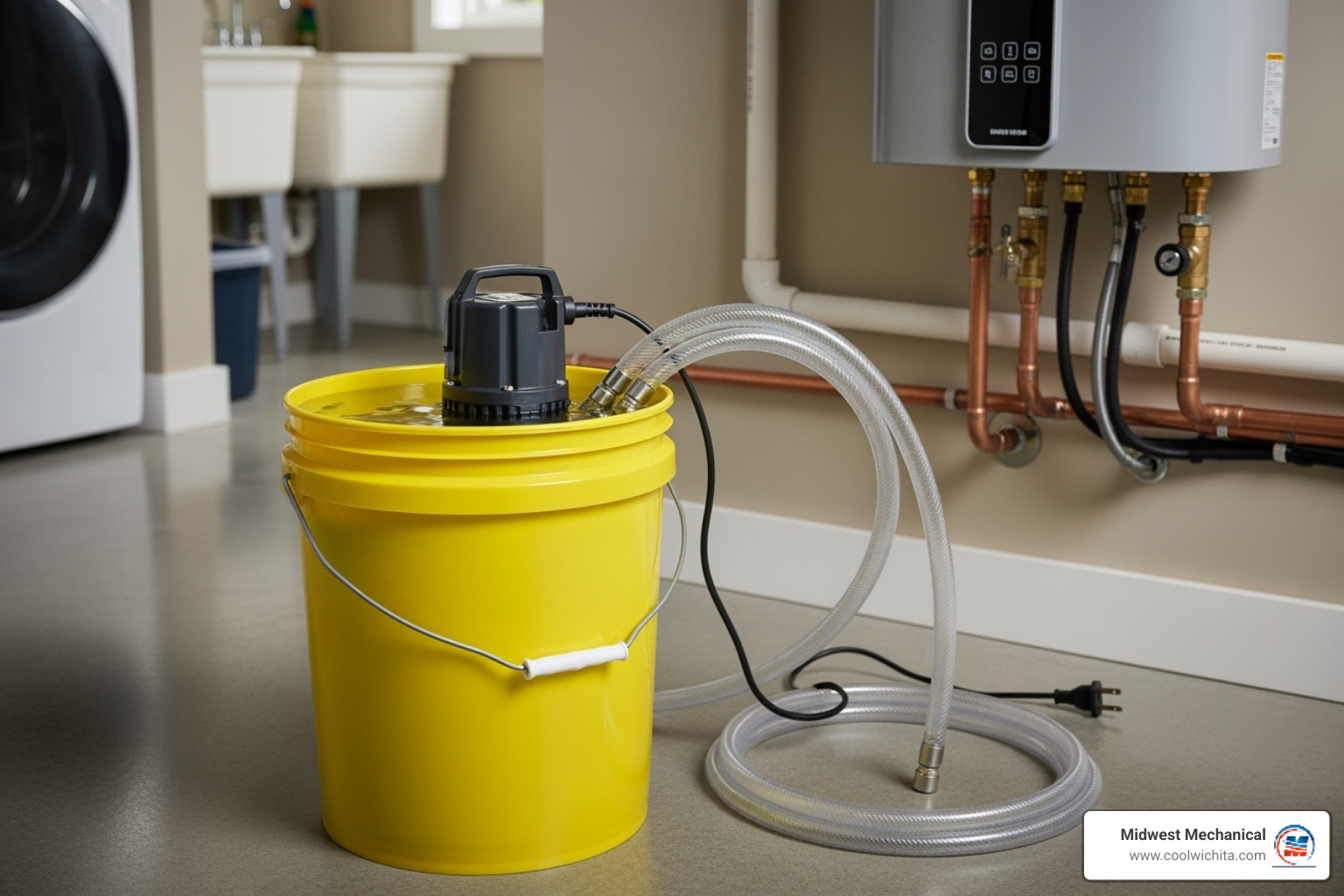What is Scale and Why Does It Matter?
Tankless water heater descaling is the process of removing mineral deposits that build up inside your unit's heat exchanger and water lines. Here's what you need to know:
- What it is: Removing calcium and magnesium deposits that accumulate over time
- Why it matters: Scale buildup can reduce efficiency by up to 30% and shorten your unit's lifespan
- How often: Most manufacturers recommend annual descaling, more frequently in hard water areas
- Signs you need it: Reduced water flow, inconsistent temperature, strange noises, or error codes
Scale forms when minerals in your water - primarily calcium and magnesium - attach to the metal surfaces inside your tankless water heater. Unlike conventional tank water heaters that store heated water, tankless units heat water on demand as it flows through the system.
This creates a perfect environment for mineral buildup.
Think of it like the crusty deposits you see on your coffee maker or showerhead. The same process happens inside your tankless water heater, but where you can't see it. Over time, these deposits act like insulation, forcing your unit to work harder to heat water.
The result? Higher energy bills, inconsistent hot water, and potential system failure.
Regular descaling removes these mineral deposits, restoring your unit's efficiency and protecting your investment. A thin layer of scale can reduce efficiency by 30%, while severe buildup can damage the heat exchanger and lead to costly repairs.

The "Why" and "When": Understanding the Need for Descaling
Maintaining your tankless water heater is crucial for its longevity and performance, and descaling is at the heart of that maintenance. We often hear from homeowners who are surprised by how much difference this simple process can make. But why is it so important, and when should you roll up your sleeves (or call us!) to get it done?

How Water Hardness Accelerates Scaling
The primary culprit behind scale buildup is hard water. Water hardness refers to the concentration of dissolved minerals, predominantly calcium and magnesium, in your water supply. Many homes in Wichita, KS, for example, have hard water. While not harmful to drink, these minerals can wreak havoc on your plumbing system and appliances.
When hard water is heated, these dissolved minerals precipitate out of the water and solidify, forming hard, crystalline deposits known as scale. This scale loves to cling to the hot surfaces inside your tankless water heater's heat exchanger and pipes. Imagine trying to heat water through a layer of rock – it’s simply inefficient!
This mineral buildup forces your tankless unit to work significantly harder to achieve the desired water temperature. As a result, efficiency can drop by up to 30% or even more. This means your energy bills climb, and your "on-demand" hot water might not feel so on-demand anymore. The harder your unit works, the more wear and tear it experiences, ultimately shortening its lifespan.
To learn more about tankless water heaters in your area, check out more info about tankless water heaters in Cheney, KS.
Signs Your Tankless Heater Needs Descaling
Your tankless water heater is usually pretty good at telling you when it's feeling a bit "scaly." Keeping an eye out for these common symptoms can save you a lot of headaches (and cold showers!) down the line:
- Reduced Water Flow: If your hot water faucets or showerheads are delivering less water pressure than usual, it's a strong indicator of scale buildup restricting flow through the unit's pipes.
- Inconsistent Water Temperature: Are you experiencing sudden temperature fluctuations, going from hot to lukewarm or even cold? Scale can interfere with the heat exchanger's ability to consistently transfer heat, leading to erratic temperatures.
- Strange Noises from the Unit: Gurgling, popping, or banging sounds often indicate that water is struggling to heat as it passes over scale deposits. These noises are essentially steam bubbles forming and collapsing within the restricted waterways.
- Error Codes on Display: Many modern tankless water heaters have digital displays that will show specific error codes when maintenance is needed. These codes often point directly to flow restrictions or overheating issues caused by scale. Always consult your owner's manual for what these codes mean.
- Longer Wait for Hot Water: If it's taking noticeably longer for hot water to reach your faucets, your unit is likely working overtime to compensate for the insulating effect of scale.
If you're noticing any of these signs, it's a clear signal that your tankless water heater is crying out for a good descaling!
How Often Should You Descale?
So, how often do you need to perform this magical ritual? The general consensus among manufacturers, like Navien, is to descale your tankless water heater at least once a year. This annual maintenance helps prevent significant buildup and keeps your unit running smoothly.
However, the "once a year" rule isn't set in stone for everyone. Several factors can influence how frequently your unit needs descaling:
- Water Hardness: If you live in an area with particularly hard water (like much of Kansas!), you might need to descale more often, perhaps every six months. In contrast, if your water is naturally soft, you might be able to stretch it to every 18-24 months, though annual checks are still recommended.
- Water Usage: Households with high hot water demand (think large families, multiple bathrooms, or frequent laundry) will circulate more water through the heater, potentially accelerating scale formation.
- Temperature Settings: Higher water temperature settings can also contribute to faster scale accumulation, as the minerals precipitate more readily at warmer temperatures.
It's always a good idea to consult your specific tankless water heater's owner's manual for their recommended descaling frequency and procedure. They often have the most custom advice for your model.
For a visual guide, you can find a helpful video on the descaling process that walks you through the steps.
Your DIY Guide to Tankless Water Heater Descaling
Feeling handy? Descaling your tankless water heater yourself is a perfectly achievable DIY project for most homeowners. It's a bit like giving your unit a spa day – a thorough cleansing that leaves it refreshed and ready to perform.

Gather Your Tools and Supplies
Before you begin, gather everything you'll need. Having your supplies ready will make the process much smoother and prevent mid-project scrambles. Here’s your shopping list:
- Submersible Pump: This is the heart of your descaling setup, used to circulate the cleaning solution.
- Hose Set: You'll need two hoses, typically washing machine hoses, to create a closed loop for the solution.
- 5-Gallon Bucket: This will hold your descaling solution.
- Descaling Solution or White Vinegar: We'll dive into the pros and cons of these options shortly, but make sure you have enough for your unit (usually 3-4 gallons of vinegar or a specific commercial descaler).
- Channel Lock Pliers: Useful for tightening and loosening hose connections.
- Towels or Rags: For inevitable drips and spills.
- Safety Glasses and Gloves: Always protect your eyes and hands, especially when working with cleaning solutions.
The Step-by-Step Flushing Process
Ready to give your tankless water heater the clean it deserves? Follow these steps carefully:
- Safety First: Turn Off Power and Gas. This is the most crucial step. Locate your tankless water heater's circuit breaker and switch it off. If it's a gas unit, turn off the gas supply valve to the heater. Safety first, always!
- Isolate the Unit: Close Water Valves. Your tankless water heater should have two isolation valves (hot and cold) and two service valves (one for hot, one for cold) on the bottom. First, close the hot and cold water supply isolation valves to your unit. This prevents water from entering or leaving the heater from your home's plumbing. Then, close the two service valves by turning their handles perpendicular to the pipes. You'll likely need to remove caps from the service valves to access the ports for hose connections. Be prepared for a small amount of water to drain out when you remove these caps.
- Connect the Hoses: Create a Closed Loop.
- Connect one end of a hose to the cold water service valve (the inlet side) and the other end to your submersible pump, which should be placed inside your 5-gallon bucket.
- Connect the second hose to the hot water service valve (the outlet side) and place the other end directly into your 5-gallon bucket. This creates a closed loop, allowing the solution to circulate.
- Prepare the Solution: Mix Descaler or Vinegar. Pour your chosen descaling solution into the 5-gallon bucket. If using white vinegar, you'll typically need 3-4 gallons of undiluted vinegar. If using a commercial descaler, follow its specific mixing instructions.
- Circulate the Solution: Run the Pump for 45-60 Minutes. Once your hoses are connected and the solution is in the bucket, open both service valves (turn them parallel to the pipes) to allow the solution to flow into the heater. Plug in your submersible pump. You'll see the solution begin to circulate through the tankless unit and back into the bucket. Let the pump run for at least 45 minutes, up to an hour, to give the descaling agent enough time to break down the mineral deposits. The water may change color as it dissolves the scale – that's a good sign!
- Flush the System: Run Fresh Water Through the Unit. After circulation, unplug the pump and close both service valves. Disconnect the hoses from the service valves. Now, it's time to flush out the descaling solution and loosened scale. Reattach a hose to the cold water service valve (inlet side) and direct the other end into a drain or utility sink. Slowly open the cold water isolation valve to your unit (the main one you closed in step 2) to allow fresh water to flow through the heater and out the drain hose. Let it flush for 3-5 minutes, or until the water runs clear and you're confident all the solution is gone.
- Reconnect and Restart: Restore Power and Water Supply. Close the cold water isolation valve. Remove any remaining hoses and replace the service valve caps. Open both the cold and hot water isolation valves to your tankless water heater. Finally, restore power to your unit at the circuit breaker and turn the gas back on if applicable. Open a hot water faucet in your home for a few minutes to ensure all air is purged from the lines and hot water is flowing normally.
For more information on tankless water heaters and their maintenance, check out more info about tankless water heaters in Benton, KS.
Key Decisions: Solutions and Professional Help
Now that you know the "how-to," let's talk about the "what" and the "who." Choosing the right descaling solution and deciding whether to DIY or call a professional are important considerations.
Choosing a Solution for Tankless Water Heater Descaling
When it comes to the descaling agent itself, you primarily have two options: white vinegar or a specialized commercial descaling solution. Both have their merits, but it's important to understand the differences.
| Feature | White Vinegar (Undiluted) | Commercial Descaling Solution (e.g., Citric-Acid Based) |
|---|---|---|
| Pros | - Readily available and inexpensive | - Formulated specifically for water heater scale |
| - Non-toxic and food-safe | - Often more effective and faster at dissolving tougher scale | |
| - Environmentally friendly and biodegradable | - May include corrosion inhibitors to protect internal components | |
| - Safe for potable water systems | - Compatible with most metal, rubber, ABS, PVC, and CPVC materials | |
| Cons | - May be less effective on heavy or old scale buildup | - Can be more expensive |
| - Requires longer circulation times (45-60 minutes) | - Requires careful handling and disposal according to instructions | |
| - Some manufacturers say it's insufficient for severe scale | - Some general-purpose chemical cleaners can be corrosive if not specifically designed for water heaters |
Many commercial descaling solutions are citric-acid based, which is a food-grade acid that is highly effective at dissolving mineral deposits without being overly corrosive to your tankless unit's internal components. Examples like Hercules Haymaker descaler are specifically designed for this purpose, ensuring compatibility with your system's materials.
While some online discussions debate the effectiveness of vinegar versus stronger acids, most experts agree that for regular annual maintenance, undiluted white vinegar is a safe and generally effective choice for light to moderate scale. For heavier buildup or if you're unsure, a purpose-built commercial solution is often a better bet. Always read the label and follow the instructions for any product you use.
DIY vs. Professional Descaling: What's Right for You?
The decision to descale your tankless water heater yourself or hire a professional often comes down to comfort level, time, and the severity of the scale issue.
Pros of DIY Descaling:
- Cost-Effective: Doing it yourself eliminates labor costs, making it the most budget-friendly option.
- Convenience: You can schedule the maintenance whenever it suits your busy schedule.
- Empowerment: There's a certain satisfaction that comes from maintaining your own home systems!
Cons of DIY Descaling:
- Time Commitment: The process itself takes about 60-90 minutes, plus gathering supplies.
- Potential for Error: Incorrect steps or improper use of solutions could damage your unit or even void your manufacturer's warranty. Navien, for instance, recommends professional service to avoid warranty issues.
- Specialized Equipment: You'll need to purchase or rent the descaling kit (pump, hoses, etc.) if you don't already own it.
Pros of Professional Descaling Service:
- Expertise and Experience: A professional plumber has the knowledge, tools, and experience to perform the descaling efficiently and correctly. They can also spot other potential issues.
- Peace of Mind: You can relax knowing the job is done right, protecting your investment.
- Warranty Protection: Many manufacturers recommend professional maintenance to keep your warranty valid.
- Comprehensive Service: Professionals often perform additional checks and maintenance during the descaling visit.
Cons of Professional Descaling Service:
- Scheduling: You'll need to schedule an appointment during business hours.
When to Call a Pro:
While DIY descaling is certainly doable, we always recommend calling a professional if:
- You're uncomfortable with the process or working with plumbing.
- Your unit is exhibiting severe symptoms of scale buildup (e.g., no hot water, persistent error codes).
- You suspect there are other underlying issues with your tankless water heater.
- You're concerned about voiding your warranty.
For expert assistance with your tankless water heater, our team at Midwest Mechanical is ready to help. We serve many communities, including Augusta, KS. Find out more about tankless water heaters in Augusta, KS.
Prevention and Consequences
Descaling is reactive maintenance – you do it when scale has already built up. But what if you could reduce scale from forming in the first place? And what happens if you just ignore the problem? Let's explore.
The Risks of Neglecting Descaling
Ignoring the need for tankless water heater descaling is like ignoring a check engine light in your car – it might seem fine for a while, but eventually, you're headed for trouble. The consequences of neglected descaling can be severe and costly:
- Heat Exchanger Damage: The delicate coils of the heat exchanger are where water is heated. As scale builds up, it insulates these coils, causing them to overheat. This can lead to cracks, leaks, and permanent damage to the most expensive component of your unit.
- Overheating: With restricted flow and insulated coils, your unit struggles to dissipate heat, leading to internal overheating. This can trigger safety shutdowns or, worse, damage internal sensors and controls.
- Premature Unit Failure: Neglecting descaling significantly shortens the lifespan of your tankless water heater. While tankless units are designed to last twice as long as traditional tank heaters (15-20 years vs. 8-12 years), a lack of maintenance can cut that lifespan in half.
- Clogged Water Lines: In severe cases, scale can break off in chunks and completely clog the internal waterways, leading to no hot water flow at all.
- Voided Warranty: Many manufacturers require annual descaling as part of their warranty terms. Fail to do so, and you might find yourself on the hook for expensive repairs that would otherwise be covered.
- Unexpected Breakdowns: The last thing you want is a cold shower on a chilly Kansas morning. Neglected scale can lead to sudden, inconvenient breakdowns, often requiring emergency service.
Skipping descaling means you're throwing money away on higher energy bills and risking the early demise of a valuable home appliance.
Preventative Measures to Reduce Scale Buildup
While descaling is essential, you can take steps to reduce the rate at which scale forms in your tankless water heater:
- Water Softeners: This is the most effective preventative measure, especially in hard water areas like Wichita. A whole-home water softener removes calcium and magnesium ions from your water before they ever reach your tankless heater (or any other appliance). This significantly reduces, or even eliminates, scale buildup.
- Water Filtration Systems: While not as comprehensive as a softener for hardness, certain filtration systems can reduce sediment and some mineral content, offering a layer of protection.
- Lowering Water Heater Temperature: If your hot water is set excessively high, lowering the temperature slightly can slow down the rate of mineral precipitation. However, ensure it's still hot enough for your needs and to prevent bacterial growth.
- Regular Filter Cleaning: Many tankless water heaters have internal filters (like a screen filter at the inlet) that catch larger particles. Cleaning these regularly can prevent them from becoming clogged and restricting flow, which can exacerbate scale issues.
- Professional Check-ups: An annual professional inspection can catch early signs of scale and ensure all components are functioning optimally, even if you DIY your descaling.
Investing in prevention, particularly a water softener, can dramatically extend the life and efficiency of your tankless water heater. For more information, explore tankless water heaters in Maize, KS.
Frequently Asked Questions about Tankless Water Heater Descaling
We get a lot of questions about tankless water heater descaling. Here are some of the most common ones we hear from homeowners:
What happens if you never descale your tankless water heater?
If you never descale your tankless water heater, you're setting it up for a tough life and an early retirement. The mineral buildup (scale) will continuously accumulate inside the heat exchanger and water lines. This acts as an insulating layer, forcing your unit to work much harder and consume more energy to heat water. This leads to a significant reduction in efficiency (up to 30%!), inconsistent hot water temperatures, reduced water flow, and strange noises from the unit. More critically, the constant overheating caused by scale can damage the heat exchanger, lead to internal component failure, and drastically shorten the overall lifespan of the unit. You'll likely face costly repairs or even premature replacement, and your manufacturer's warranty could be voided. It’s definitely not a path to longevity or savings!
Can I use CLR to descale my tankless water heater?
While CLR (Calcium, Lime, and Rust Remover) is a popular household cleaner for mineral deposits, we generally do not recommend using it to descale your tankless water heater unless explicitly approved by your specific water heater's manufacturer. Many general-purpose chemical cleaners, including CLR, can be too harsh or contain ingredients that are corrosive to the sensitive internal components (like copper heat exchangers, rubber seals, and plastic parts) of a tankless water heater. Using an unapproved chemical could lead to damage, leaks, or even void your warranty. It's always safest to stick with a descaling solution specifically designed for tankless water heaters (often citric-acid based) or undiluted white vinegar, as these are formulated to be safe for your unit's materials.
How long does it take to descale a tankless water heater?
The entire tankless water heater descaling process typically takes between 60 to 90 minutes from start to finish. This includes the time it takes to set up your equipment, circulate the descaling solution, flush the system with fresh water, and reconnect everything. The actual circulation of the descaling solution through the unit is usually the longest part, lasting about 45 to 60 minutes, depending on the severity of the scale buildup and the type of descaling solution used. While it requires a bit of time and attention, it's a manageable task that can significantly impact your unit's performance and lifespan.
Keep Your Hot Water Flowing
Your tankless water heater is a marvel of modern plumbing, providing endless hot water on demand and saving energy. But like any high-performance appliance, it thrives on regular maintenance. By understanding the importance of descaling, recognizing the signs of scale buildup, and performing this vital task – whether DIY or with professional help – you're actively protecting your investment and ensuring consistent, efficient hot water for years to come.
At Midwest Mechanical, we believe in providing total home comfort with traditional service and state-of-the-art systems. We're here to ensure your tankless water heater runs at its best, preventing unexpected issues and extending its life. For expert assistance with your water heater needs in Wichita, KS, our team is ready to ensure your system runs efficiently for years to come. We proudly serve homeowners across the region, including Andover, Bel Aire, Derby, Goddard, Kechi, Maize, Mulvane, Newton, Rose Hill, Sedgwick, and Valley Center.
Customer Testimonials
Hear from satisfied customers who trust us for reliable HVAC and plumbing service across Wichita.






Plus, the technician, Lee was very professional, knowledgeable and informative.
We will definitely be doing business with them sometime again in the past.


I'm prompt to my appointment. Thank you Midwest Mechanical.









We have partnered with GoodLeap to offer flexible payment options for your project. GoodLeap uses a soft credit check until funding and the highest score from all 3 bureaus to see if you qualify. It also takes just a few minutes to get started.




Service Areas
.svg)




